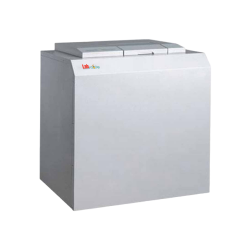
Automatic Bomb Calorimeter LMABC-B101 It is engineered for the precise measurement of the calorific value of both solid and liquid combustible materials. Accommodating a bomb volume of 282 ml and takes 15 to 25 min for test analysis. The Bomb Calorimeter is furnished with advanced features, including a semi-automatic oxygen filling, and releasing system.
Get Quote| Calorimeter Type | Isoperibol |
| Oxygen Filling | semi-automatic |
| Bomb Volume | 282 ml |
| Analysis Time | 15 to 25 min |
| Bomb Washing | Manual |
| Maximum Bomb Pressure | 20 Mpa |
| Bomb Identity | No |
| No. Of Tests | 2 to 4/hour |
| Temperature Resolution | 0.0001 K |
| Precision (RSD) | ≤ 0.15 % |
| Heat Capacity Stability | ≤ 0.25 % |
| Gas Requirement | 99.5 % oxygen |
| Water Requirements | Distilled water |
| Energy Measurement Range | 0 to 50000 J |
| Bucket Filling | Semi-Automatic |
| Stirring Method | Blades |
| Reproducibility | 0.15 % (analysis of 1 g of benzoic acid) |
| Temperature Increase | 2°C (average) |
| Temperature Measurement | PT1000 (temperature probe) |
| Working Temperatures | ≤ 32°C |
| Cooling Type | Automatic water circulation |
| Network | Yes |
| Maximum Power | 0.5 kW |
| Power Supply | 220 V ±, 15 to 10 %, 50/60 Hz |
| Advance Calculations | No |
| Main Body Dimension | 600 × 417 × 908 mm |
| Weight | 106 Kg |
 Facilitates oxygen bomb tightness examination
Facilitates oxygen bomb tightness examination
 Equipped with blades to achieve high stirring efficiency, and faster heat transfer
Equipped with blades to achieve high stirring efficiency, and faster heat transfer
 Ensures precise test results through the use of ample water quantities
Ensures precise test results through the use of ample water quantities
 Maintains a minimal temperature difference in the jacket water (less than 0.1K) for consistent testing
Maintains a minimal temperature difference in the jacket water (less than 0.1K) for consistent testing
 Features robust data processing capabilities, statistical reporting, and printing functions
Features robust data processing capabilities, statistical reporting, and printing functions
 Provides genuine test data without the need for software modifications
Provides genuine test data without the need for software modifications
 Equipped with an RS232 interface for data transfer
Equipped with an RS232 interface for data transfer
 Offers dependable test data without requiring software adjustments
Offers dependable test data without requiring software adjustments
 Confirmed to the international standards ASTM D5865, ISO 1928
Confirmed to the international standards ASTM D5865, ISO 1928
| Accessories no. | Name | Unit | Qty. |
| 1 | Ignition thread (500 pieces) Box | Box | 20 |
| 2 | Standard Benzoic Acid (1 gm * 10 pieces) | Bottle | 10 |
| 3 | Gasket Ring for Oxygen Filling Facility (big, middle, small) | Set | 15 |
| 4 | Heating Crucible | PC | 60 |
| 5 | Oxygen bomb gasket ring (big, middle, small) | Set | 15 |
| 6 | Plastic insulation cover | Set | 5 |
| 7 | Special Oxygen filling pipe | PC | 2 |
| 8 | Electrodes | Set | 1 |
It is primarily used in coal, petroleum, cement, agriculture, medical research, electronics, scientific research, quality control, and testing laboratories to measure the energy content of various materials, including fuels, food, and other combustible substances.
Get Quote for
Automatic Bomb Calorimeter LMABC-B101